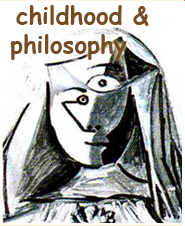the philosophical attitude in the education of philosophy. new reflections
Mots-clés :
Philosophy for children - philosophical attitude - community of inquiryRésumé
In this article we try to answer the following questions What is philosophy? What do I understand by philosophy and which should be its role in our time? Can philosophy be taught? If so, how can it be done? What is philosophical attitude? Does it really exist something that we can call philosophical attitude? We consider that the best atmosphere to teach and to learn philosophy is created by the New or Active School Pedagogy because it understands the pedagogical relationship between teacher and students as a reciprocal relation of mutual respect. We refer to the three moments of its development and raise that the philosophical and pedagogical proposal of Matthew Lipman constitutes the continuation and development of this pedagogy. The group of Research in Education and Philosophy is constructing the concept of philosophical attitude. Philosophical attitude is reached when someone has become qualified to work in group because it is accepted that in a community of philosophical inquiry where knowledge in an open and participating dialogue between teacher and students is built, and where there is a listening capacity and arguments are based in reasons due to reflective thinking. Somebody with philosophical attitude is tolerant, self-corrective, constructs knowledge with others, and does not consider herself the holder of truth, is solidarious and shares ideas with her companions and teacher.Téléchargements
Les données relatives au téléchargement ne sont pas encore disponibles.
Téléchargements
Publiée
2012-01-03
Comment citer
BERNAL, Julio santiago cubillos. the philosophical attitude in the education of philosophy. new reflections. childhood & philosophy, Rio de Janeiro, v. 2, n. 4, p. pp. 271–291, 2012. Disponível em: https://www.e-publicacoes.uerj.br/childhood/article/view/20497. Acesso em: 25 sept. 2025.
Numéro
Rubrique
articles




